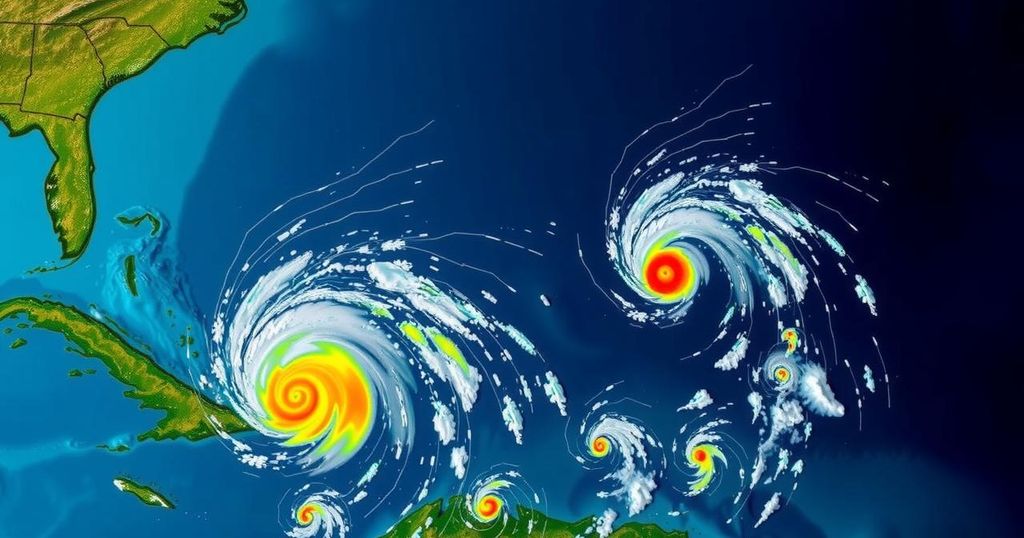2024 Atlantic Hurricane Season: An Overview of Activity and Impacts

The 2024 Atlantic hurricane season concluded with 18 named storms, including 11 hurricanes and five major hurricanes. Hurricane Beryl set a record as the earliest category five storm, followed by a quiet mid-season before Hurricane Helene intensified rapidly. Climate change has amplified hurricane wind speeds and rainfall, indicating more dangerous future storms despite no increase in overall storm frequency.
The 2024 Atlantic hurricane season, which runs from June 1 to November 30, is concluding with significant activity and several impactful events. A total of 18 named tropical storms were documented, 11 of which escalated to hurricane status, and five achieved major hurricane classification, indicating category three strength or higher. This performance exceeds the average season’s expectation of 14 storms, seven hurricanes, and three major hurricanes, marking a noteworthy year for meteorological records.
Early predictions indicated an above-average hurricane season, with Hurricane Beryl making history as the earliest category five hurricane recorded, striking the Caribbean and southern Texas and leading to significant devastation and fatalities. However, after Beryl subsided, the Atlantic experienced an unanticipated lull with only four named storms occurring until the emergence of Hurricane Helene on September 24.
The decline in activity during the heart of the season appeared unusual despite favorable conditions such as warmer sea temperatures and the dissipating influence of El Niño. Factors contributing to this phenomenon included potential changes in weather patterns in Africa affecting thunderstorm developments, along with a presence of Saharan dust that might have hindered storm formation.
The season regained momentum in late September with Hurricane Helene, which transformed into a category four hurricane and inflicted catastrophic flooding and damage across the southeastern United States, resulting in over 150 fatalities. In a rapid succession of storms, six formed following Helene, including Hurricane Milton, which exhibited one of the most extreme cases of rapid intensification on record.
The effects of climate change are under scrutiny, as persistent high sea temperatures are believed to drive the severity of storms. Research indicates that human-induced climate change contributed significantly to the wind speeds and rainfall levels associated with major hurricanes, reinforcing the notion that while the frequency of tropical cyclones may not increase overall, their intensity and rapid development are likely to escalate, posing greater dangers to affected regions.
The Atlantic hurricane season, traditionally regarded as a critical period for tropical storm activity, typically witnesses its peak activity between September and early October. Meteorological conditions such as ocean temperatures and the atmospheric phenomena like El Niño play pivotal roles in storm development. The 2024 season was marked by unprecedented phenomena, including historical storm categories and the complex interplay of natural systems. Enhanced by climate change, the resultant storms posed notable threats to coastal communities, emphasizing the need for preparedness amid changing climate patterns.
In summary, the 2024 Atlantic hurricane season has proven to be exceptional, characterized by a high number of storms and significant impacts resulting from major hurricanes. Despite a mid-season lull, the resurgence of activity illustrates the unpredictability of tropical storm systems. The ongoing influence of climate change remains a critical factor in determining storm intensity, compelling an ongoing assessment of preparedness and response strategies for affected regions.
Original Source: www.bbc.com






